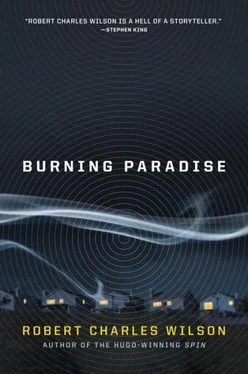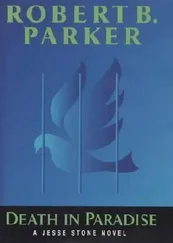Still, Cassie hadn’t given up. Aunt Ris had agreed that Cassie could write to her, “If you really need to.” And that was what Cassie had done. She composed small, careful, impersonal notes and mailed them at irregular intervals. She hoped her aunt felt obliged to read them, if not to respond.
Most recently Cassie had written to Aunt Ris about Josh. Cassie had met Josh through her membership in the Albright-Knox Art Gallery. A spontaneous conversation about French impressionism had turned into a first date: thank you, Henri Matisse. Josh was single, thirty years old, an engineer at a Cheektowaga tool-and-die firm that had managed to survive the communications crisis. He had no connection with the Correspondence Society.
Last week Josh had asked Cassie to marry him. And Cassie had agreed. But she didn’t want to import a lie into their marriage. That was why she needed to speak to her uncle and her aunt.
Cassie talked a little about Josh, about how much he meant to her and how important it was not to lie to him even about what happened in the Atacama— especially about what happened in the Atacama. But she had promised her uncle never to share that secret. That was why she needed his permission… and her aunt’s permission, too, since Aunt Ris was an essential part of the story.
Cassie would not, of course, speak publically about any of this. The existence of the Correspondence Society had become common knowledge, but their role in it was known only to themselves. That wouldn’t change. She just needed to be able to speak freely to Josh.
“And how do you suppose he’ll react,” Aunt Ris said, “when you tell him you’re responsible for the state of the world today?”
“That’s not fair,” Uncle Ethan said. “Cassie’s not responsible for what happened in the Atacama or what came after. If anyone is, I am. I’m the one who pulled the trigger.”
“And loaded the gun in the first place. You’re right!” She turned to Cassie. “What exactly do you propose to say to Josh? Are you going to tell him the truth about Thomas? The truth about Leo? Are you going to tell him how they used us? Used you ?”
It wasn’t as simple as that. Cassie had given careful thought to the question of what Leo and Thomas had done and why. Both had been agents of the hypercolony. Both had wanted to destroy the parasitized breeding ground. They would have known they needed a human accomplice. At first Leo had chosen Beth to play that role—Beth was motivated and demonstrably capable of violence. But Leo had found a better weapon in Cassie. More reliable. More versatile. And just as easy to manipulate.
Thomas had motivated her from a different direction. He had encouraged her to trust Leo, to follow Leo, to defer to Leo, but more than that, he had given her something to protect, an example of courage she felt obligated to live up to.
Would she say these things to Josh? Of course she would. That was the point. Would it change things between them? She hoped not. “I mean to tell him everything.”
“And I’m sure I can’t talk you out of it.” Aunt Ris nodded. “All right. You have my blessing. I hope it works out. And I hope he understands.”
“He will.”
“Are you sure about that?”
Cassie hesitated. “I trust him.”
“Really? I can’t imagine what that’s like. I honestly don’t remember. But I suppose I envy you a little.” Aunt Ris stood up. She hadn’t even taken her coat off. “Have a good life, Cassie. I mean it. I wish you the best. But I don’t want to see you again. And I resent you asking me to come here to conduct business we could have conducted by mail.”
“I needed to talk to both of you…”
“No you didn’t. You were harboring some idea that we might be reconciled. But that’s not possible. What ever there was between us, your uncle took it away.”
“That’s not true!”
“But it is.”
“I’m sure Uncle Ethan didn’t know—”
About Thomas, she meant to say, but her uncle cleared his throat and said, “Stop, Cassie. She’s right.” He was framed by the window that overlooked Antioch Street, the falling snow, frost on glass. His shoulders were braced but his head was bowed. “I knew exactly what would happen. They told me in great detail.”
“ Who told you?”
“The sims at the breeding ground. They told me about Thomas. They said they would be able to take control of him soon, since the original hypercolony was in a weakened condition. They promised they would let him continue functioning in every way as a normal child. Only I would know the truth. But if the compound was destroyed, Thomas would die. They were explicit about it.” He lifted his head and looked directly at Aunt Ris: “They told me you’d spend your life grieving. That you would despise me for it. That Cassie’s life would be devastated. That she would blame herself for Thomas’s death, no matter what I said.”
Aunt Ris stared. “And did you believe them?”
“In the end? Yes.”
“But you let the breeding ground be destroyed.”
“Was I wrong?”
“No, don’ t ask me that. I can’t absolve you, Ethan. Even if what you did was right—it was inhuman.”
“Of course it was. That was their mistake. They meant to exploit my humanity. The only way to resist them was to do what seemed inhuman. It was the only weapon I had left.”
“What a wonderfully Jesuitical way of reasoning.” She opened the door and stepped into the hall.
Cassie took a step after her. “Please… Aunt Ris. I never meant to make you unhappy.”
“I’m glad you found a way to turn your back on the past. I need to do that too—do you understand? And it will be easier if you stop writing to me.”
“Please don’t say that!”
“But it’s the truth. And it’s better to know the truth than to live in a fool’s paradise. Isn’t that what you believe?”
Her footsteps faded down the stairs.
“She’s mostly right,” Uncle Ethan said. “About what I did.”
“You should have told me.”
“After we destroyed the breeding ground, I thought it didn’t matter.”
She tried to imagine how it must have been for Uncle Ethan during those awful hours in the Atacama, knowing the destruction of the facility would tear the heart out of his family. She said, “I would have burned it down anyway, with or without your help.”
“I knew that, Cassie.”
And maybe he had known it. Maybe he had guessed it when she told him about Leo. Maybe he had not wanted her to bear the entire burden of that choice. Maybe that was why he had insisted on setting the charges himself.
“The way I see it,” her uncle said, “you could get angry and walk out of here, and I wouldn’t blame you any more than I blame your aunt. Or you can stay and have a cup of coffee to set you up for the drive home.”
“I do have to leave before the roads get much worse. But I’m not angry. And coffee sounds good. Maybe with something stronger in it?”
She phoned Josh to let him know she was all right and that she would be leaving her uncle’s place soon. He said he was watching the war news on TV. Threats and negotiations had given way to an ominous silence. “Be careful driving home,” he said. He was hoarse—recovering from a winter cold—but the sound of his voice warmed her.
Buttoning her jacket, she asked Uncle Ethan whether he thought there would be a war.
“I don’t know. Without the hypercolony, there’s nothing to prevent it.”
“Nothing but common sense.”
“With which we’re not conspicuously well-supplied.”
“All the hypercolony ever had of humanity was what it took from us. You taught me that. If it exploited our technology, that’s because we have a genius for making things. If it exploited our economy, it’s because we have a genius for collaboration. And if we made peace, maybe we have a genius for peacemaking.”
Читать дальше










